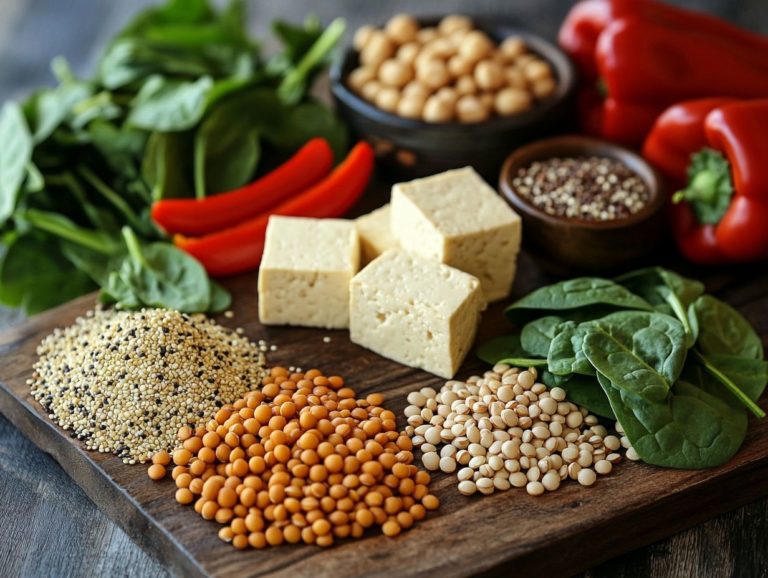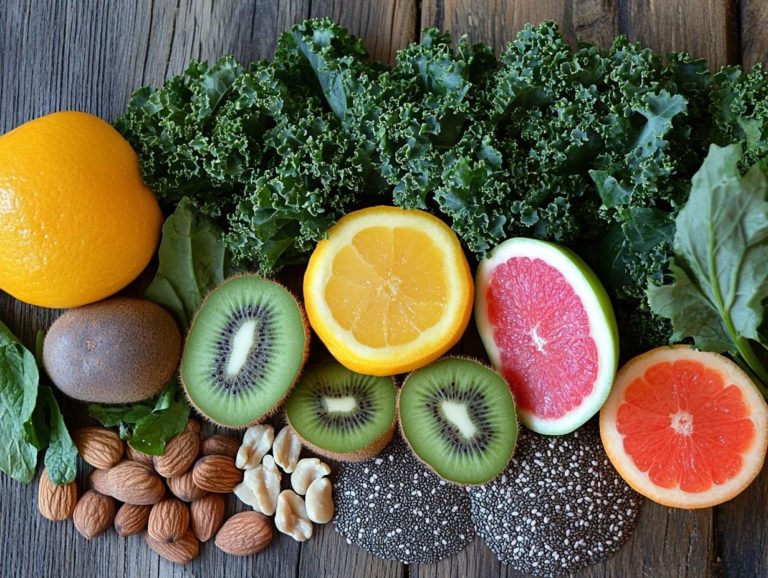Breaking Down the Myths of Gluten-Free Diets
In recent years, gluten-free diets have surged in popularity, often surrounded by a cloud of misconceptions. Many individuals believe these diets are solely essential for those with celiac disease, while others mistakenly assume they are inherently healthier for everyone.
This article aims to clarify what gluten is, what a gluten-free diet truly involves, and who might genuinely reap the benefits. It also tackles common myths head-on and offers practical tips for embracing a nutritious gluten-free lifestyle, ensuring you possess the knowledge to make informed dietary choices.
Contents
Key Takeaways:

Gluten is a protein found in wheat, barley, and rye, and a gluten-free diet excludes these grains.
Gluten-free diets are not just for those with celiac disease and may not always be healthier or easy to follow.
Gluten-free diets may be beneficial for those with celiac disease or gluten sensitivity, but it’s important to choose nutritious options and consult with a healthcare professional.
Understanding Gluten and Gluten-Free Diets
Understanding gluten is vital for your health, especially if you have gluten sensitivity or celiac disease. Gluten, a protein present in wheat, barley, and rye, can provoke serious reactions for those affected, necessitating dietary restrictions that are vital for their well-being.
The gluten awareness movement, backed by medical professionals and organizations, seeks to enlighten the gluten community about the significance of managing gluten intake through informed dietary choices. This understanding helps those with gluten-related disorders lead healthier lives without the risk of nutrient deficiencies that may arise from unsuitable gluten alternatives.
What is Gluten?
Gluten is an intricate blend of proteins predominantly found in wheat, barley, and rye. It helps make bread and pastries soft and chewy.
This unique combination consists of two primary types of proteins: gliadin and glutenin. Gliadin lends elasticity to dough, while glutenin enhances its strength, allowing your baked goods to rise and hold their shape beautifully.
However, for many individuals, gluten can be problematic. Those with gluten intolerance or celiac disease might experience a range of symptoms, from gastrointestinal distress to systemic inflammation, upon consuming gluten-containing products.
This highlights the importance of understanding these proteins and their potential effects on health.
What is a Gluten-Free Diet?
A gluten-free diet is one that you strictly adhere to, avoiding any foods containing gluten think wheat, barley, and rye while emphasizing gluten-free options and alternatives.
This dietary approach is crucial for individuals diagnosed with gluten-related disorders, like celiac disease, where even the tiniest trace of gluten can lead to serious health complications.
However, if you don t have such conditions, you might opt for a gluten-free lifestyle for various reasons, such as enhancing digestion or boosting your energy levels.
By focusing on naturally gluten-free foods like fruits, vegetables, beans, and lean proteins, you can uncover a delightful variety of meals. The presence of gluten-free grains such as quinoa, rice, and buckwheat enables you to explore a rich culinary landscape while prioritizing your health.
Debunking Common Myths about Gluten-Free Diets
Debunking common myths about gluten-free diets is crucial for cultivating a clear understanding of gluten awareness among both the general public and individuals with gluten sensitivity or celiac disease. For a comprehensive look at these issues, you can refer to understanding the gluten-free diet. Numerous misconceptions linger regarding the necessity and health implications of a gluten-free diet, often creating confusion and misinformation.
Health professionals, including renowned experts like Alice Bast and Roxana Ehsani, dedicate their efforts to dispelling these myths and educating the gluten community about the realities of gluten consumption.
Myth #1: Gluten-Free Diets are Only for People with Celiac Disease

One of the most persistent myths is that gluten-free diets are solely for those diagnosed with celiac disease. However, that’s not entirely accurate.
More people who haven’t been diagnosed with celiac disease are discovering significant relief from symptoms related to gluten intolerance and sensitivity that doesn t involve celiac disease. They are embracing a gluten-free lifestyle.
After cutting gluten from your diet, you might notice improved digestion and reduced bloating. Your overall well-being may also enhance. This growing awareness shows that gluten can affect individuals in many ways.
The implications extend far beyond celiac disease. Many individuals recognize that a gluten-free diet can play a crucial role in their health journey.
Myth #2: Gluten-Free Diets are Always Healthier
Another common misconception is that all gluten-free diets are inherently healthier than standard diets. This belief is often fueled by gluten marketing and product labeling.
While many gluten-free products are marketed as healthier alternatives, their nutritional profiles can fall short when compared to gluten-containing options. Several gluten-free foods are heavily processed and may lack essential nutrients like fiber, iron, and B vitamins, which are abundant in whole grains.
This raises legitimate concerns about nutrient deficiencies in gluten-free diets, especially if you don’t actively seek out a variety of nutrient-rich foods. As you navigate gluten marketing, it s vital to prioritize well-rounded dietary choices that offer health benefits beyond simply avoiding gluten.
Myth #3: Gluten-Free Diets are Difficult and Restrictive
Many perceive gluten-free diets as overly restrictive and challenging to maintain. This can discourage exploration of gluten-free options.
These misconceptions often arise from a lack of awareness about the delightful variety of foods available that allow you to enjoy meals without worrying about gluten.
By embracing this lifestyle with an open mind, discover fantastic grains like quinoa, rice, and buckwheat that can enhance your meals! Cooking at home transforms into an exciting adventure where you can unleash your creativity and experiment with flavors.
You will find many recipes to help you reinvent traditional dishes, ensuring that satisfaction and taste are never sacrificed on your gluten-free journey.
The Truth about Gluten-Free Diets
The essence of gluten-free diets lies in understanding who truly benefits from such a regimen, along with the advantages and disadvantages that come with it, particularly regarding the health effects of gluten.
Understanding these nuances is essential for making informed dietary choices.
Who Should Follow a Gluten-Free Diet?
If you’ve been diagnosed with celiac disease or sensitivity to gluten that doesn’t involve celiac disease, it s vital to commit to a strict gluten-free diet. This is essential for managing your health effectively.
This dietary restriction is not just a suggestion; even tiny traces of gluten can provoke serious reactions, leading to uncomfortable symptoms like gastrointestinal distress, headaches, and fatigue.
If left unmanaged, these conditions could result in long-term health complications. Health professionals, including dietitians and physicians, are instrumental in guiding you through gluten management.
If you’re unsure about how to manage gluten in your diet, don’t hesitate to consult a dietitian or physician. They will help you navigate the gluten-free world effectively.
They ll assist you in making informed food choices, teach you how to read labels for sneaky gluten, and help you understand the risks of cross-contamination. With their support, you can maintain a safe and balanced diet while promoting your overall wellness.
Benefits and Drawbacks of a Gluten-Free Diet

The gluten-free diet presents a range of health benefits, such as improved digestion and relief from symptoms associated with gluten-related disorders. However, it is important to recognize that it may also have potential downsides, particularly nutrient deficiencies if not carefully managed.
Embracing this diet may boost your energy levels. You might also notice an overall enhancement in well-being, especially if you are gluten-sensitive. This change can significantly elevate your quality of life. It is vital to maintain nutritional balance as you consider this lifestyle shift.
Removing gluten-containing grains might reduce vital vitamins and minerals. As you transition, prioritize gluten alternatives like quinoa, brown rice, and gluten-free oats, which can help provide the necessary nutrients your body craves.
Ultimately, it is vital to cultivate a well-rounded diet to prevent deficiencies and ensure that your body receives the nourishment it needs while reaping the benefits of a gluten-free lifestyle.
How to Follow a Healthy Gluten-Free Diet
Embracing a healthy gluten-free diet requires careful selection of nutritious gluten-free foods. It is essential for you to effectively manage your gluten consumption while maintaining a balanced intake of nutrients.
Tips for Choosing Nutritious Gluten-Free Foods
Choosing nutritious gluten-free foods demands a solid understanding of available options and cooking techniques to achieve a balanced diet that aligns with your wellness goals. Being well-informed about gluten sources beyond just the obvious bread and pasta can significantly elevate your dietary choices.
For instance, gluten often lurks in less conspicuous items like sauces, dressings, and processed snacks. This makes scrutinizing gluten labels and ingredients essential for anyone wishing to avoid it; it is a key step in safeguarding your health and maintaining an active lifestyle.
Try healthy alternatives like quinoa or brown rice. These options not only introduce nutritional variety but also support your overall well-being. By prioritizing these strategies for effective gluten management, you can craft wholesome meals that contribute to your long-term health objectives.
Frequently Asked Questions
What is a gluten-free diet?
A gluten-free diet eliminates the consumption of gluten, a protein found in wheat, barley, rye, and other grains. It is primarily followed by individuals with celiac disease, gluten intolerance, or wheat allergy.
Is a gluten-free diet only for people with celiac disease?

No, a gluten-free diet is not exclusively for people with celiac disease. While it is essential for those with celiac disease, it is also beneficial for individuals with gluten intolerance or sensitivity. It can also be followed by people looking to improve their overall health and well-being.
Are there any health benefits to following a gluten-free diet?
There are potential health benefits to following a gluten-free diet, but it is not suitable for everyone. For people with celiac disease or gluten sensitivity, following a gluten-free diet can improve digestive symptoms, increase energy levels, and promote overall well-being. However, for people without gluten-related health issues, there is no significant evidence of health benefits from a gluten-free diet.
Can a gluten-free diet lead to weight loss?
There is a common misconception that a gluten-free diet can lead to weight loss. However, this is not necessarily true. Eliminating gluten from your diet without proper nutrition and portion control may lead to weight loss, but this is not a healthy or sustainable method. A well-balanced gluten-free diet can lead to weight maintenance, just like any other healthy diet.
Are all gluten-free products healthy?
No, not all gluten-free products are healthy. Just because a product is labeled as gluten-free does not mean it is automatically healthy. Some gluten-free products may be highly processed and contain unhealthy ingredients like added sugars and fats. It is essential to read labels and choose gluten-free products that are also nutrient-dense and minimally processed.
Is a Gluten-Free Diet More Expensive Than You Think?
Some gluten-free products may cost more than their gluten-filled alternatives. However, you can follow a gluten-free diet without breaking the bank.
Whole, unprocessed foods like fruits, vegetables, lean proteins, and gluten-free grains are often affordable. Planning ahead is important. Shop smart and cook meals at home to save money on your gluten-free journey!






